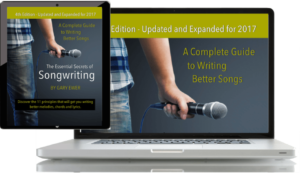A number of years ago I taught aural skills (ear training) at Dalhousie University. As part of that course, students had to listen to melodies as I played them at the piano, and then they would write down in musical notation what they heard.
As you can imagine, some students found this relatively easy while others struggled massively with the task. For those who struggled I would give this piece of advice: write down anything, even if you’re sure you’ve got it wrong.
 Words and music need to act as partners in a song, but how do you make sure your melody is helping your lyric? That’s what Chapter 5 of “The Essential Secrets of Songwriting” deals with. Get that eBook as part of the 10-eBook Bundle, or purchase it separately.
Words and music need to act as partners in a song, but how do you make sure your melody is helping your lyric? That’s what Chapter 5 of “The Essential Secrets of Songwriting” deals with. Get that eBook as part of the 10-eBook Bundle, or purchase it separately.
The reason for writing obvious errors down was this: you can fix errors, but it’s hard to fix a blank page.
A page with lots of errors at least gives you something to go back and fix. But a blank page? It’s hard to know what to do with that. The students who “roughed in” whatever they could usually at least had the basic shape of the melody right (the ups and downs), and that’s worth something. Students staring at a blank page felt stuck, with no easy way to move forward with the task.
There is an important “blank page” metaphor here for songwriters. When you’re at the very beginning stages of writing a song, the best thing you can do is:
- Turn off your inner critic.
- Write quickly.
- Ignore (for the moment, anyway) when something doesn’t sound good.
What this gives you is a first draft that’s not really what it’s going to eventually sound like. But at least you’ve got something written down. And because it’s easier to fix errors than it is to fix a blank page, you’ve given yourself something tangible to work with.
Once you’ve got this less-than ideal version of your song down, it’s time to switch your inner critic back on and fix your song note-by-note, chord-by-chord, bar-by-bar.
Learning to silence your inner critic is an important skill the best songwriters have honed over the years. If this approach to songwriting is new to you, you’ll find it hard. Being critical of your songwriting attempts may come naturally to you, and I encourage you to put the time in switching off your critical brain, at least until you’ve got the majority of your new song created.
This early version of your song will sound messy and weak, but you’ve at least now got something to fix.
 Written by Gary Ewer. Follow Gary on Twitter.
Written by Gary Ewer. Follow Gary on Twitter.
 “Hooks and Riffs: How They Grab Attention, Make Songs Memorable, and Build Your Fan Base” shows you how a good hook can make the difference between songwriting success and failure. With great examples from pop music history.
“Hooks and Riffs: How They Grab Attention, Make Songs Memorable, and Build Your Fan Base” shows you how a good hook can make the difference between songwriting success and failure. With great examples from pop music history.










